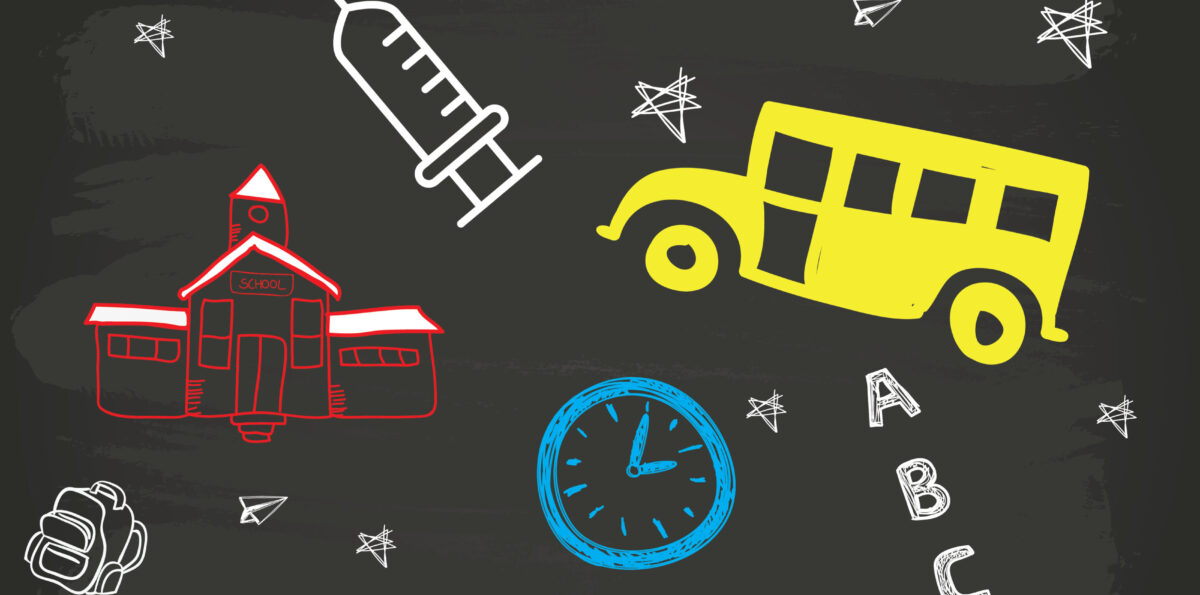Your guide to back-to-school immunizations

A law that went into effect in Washington state in 2019 requires all children entering kindergarten, in public and private schools, to receive the MMR (measles, mumps, rubella) vaccine before entering school. The law also eliminates philosophical objections to getting the vaccine (although parents can opt out for religious or valid medical reasons).
Staying up-to-date on vaccinations helps keep children, schools and the community safe from potential outbreaks of serious diseases. Unvaccinated children are more likely to catch and spread highly contagious illnesses such as whooping cough (also called pertussis) and measles.
Gloria Lowe, MD, a family practice physician at MultiCare Eatonville Clinic and mother of four children, urges parents to keep informed about the topic of immunizations.
“There’s a lot of misinformation out there,” she says. “It’s important for adults, and older children for that matter, to learn what good science is, to learn the facts.”
Dr. Lowe recommends the Children’s Hospital of Philadelphia Vaccine Education Center as a reliable source of objective information about vaccinations.
“Between birth and 18 months, children receive a primary series of vaccinations,” says Dr. Lowe. “At ages 4 to 5, children get additional doses of MMR, DTap, polio and varicella vaccines, then more boosters at ages 11 to 12.”
Some vaccines due at these ages are also required by the Washington State Department of Health prior to the first day of kindergarten and sixth grade. Others, before preschool or entering child care. Children under 5 years of age must be vaccinated against Haemophilus Influenzae type b (Hib) vaccine and pneumococcal vaccine (PCV), though these aren’t required for kindergarten through 12th grade entry.
What vaccinations does my child need for school?
By the time your child enters kindergarten, required vaccinations will include:
- MMR (measles, mumps, rubella)
- Polio
- DTaP (diphtheria, tetanus and pertussis)
- Chickenpox/varicella
- A yearly flu shot*
- Hepatitis B
The average 11- to 12-year-old should receive these immunizations before school:
- Tdap (tetanus, diphtheria, pertussis)
- Human Papillomavirus (HPV, two doses for those under 15 years old, or three doses for those over 15)
- Meningitis (MCV4)
- A yearly flu shot*
- Any missing shots from the list above or not received as babies, such as Hepatitis A vaccine
*The Centers for Disease Control and Prevention (CDC) recommends a yearly flu vaccine for everyone 6 months and older.
The COVID-19 pandemic put a lot of families behind on routine health care appointments last year — including vaccines for kids. So it’s extra important to check to see what your child might need before the start of this school year.
And remember, even if you are planning to continue virtual learning for your child, the Washington State Department of Health states that all students must have all their required vaccines to start school — including students attending school online.
Vaccine requirements can change, so it’s important to keep up to date: visit doh.wa.gov and tpchd.org for more information.
What about COVID-19 vaccines?
There are several safe and effective COVID-19 vaccines available through Emergency Use Authorization by the FDA to reduce risk of Coronavirus illness complications and spread — including the Pfizer vaccine that is approved for use in individuals 12 and under.
You should talk to your child’s doctor about whether they recommend the COVID-19 vaccine for your child. As of this writing, COVID-19 vaccines are not among those vaccines required in Washington state for your child to attend school or day care.
How do I get my child’s immunization records?
With the widespread use of electronic health records, it’s easier to keep track of your children’s immunization’s records.
“At MultiCare, parents can get that information on their child through logging into MyChart, and they can opt to receive automatic text reminders of when vaccinations are due,” Dr. Lowe says.
Parents are also given a printout of their child’s vaccination records each time they receive their shots.
Of course, people move and change health care providers all the time. Parents should always keep immunization records on file at home. Contact your child’s doctor, nurse or clinic for complete records. If you can’t get a complete immunization history from your provider, you can most likely get records from the Washington State Immunization Information System; contact the Office of Immunizations and Child Profile at 360-236-3595 or 866-397-0337.
What if my child is afraid of getting shots?
Most people, including adults, don’t like getting shots. Dr. Lowe advises that parents be straightforward with their children, along with providing emotional support while shots are being given.
“Hold their hand, look them in the eyes and tell them this will hurt a little but just for a short time and it’s important to keep you healthy,” she said. “Tell them you know they are brave and they will believe that, too. Please, never talk about shots as though they were punishment. I’ve had parents tell kids, jokingly, ‘Be good for the doctor or you’ll get a shot.’ Please don’t do that.”
Where can I get my child’s shots?
Your child’s regular doctor can give them any back-to-school vaccines they are due for. At MultiCare, we offer vaccines at our primary care clinics, as well as at many Mary Bridge Children’s locations. Mary Bridge Children’s also partners with the Tacoma Pierce County Health Department to provide FREE vaccines for children.
Editor’s note: This article was originally published Aug. 8, 2019, and updated July 31, 2021.